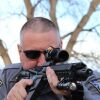The PoliceOne Academy features hundreds of police training videos on a wide range of topics including firearms tactics, communications skills, tactical emergency medical support and officer survival. Visit the PoliceOne Academy to learn more and for an online demo.
It is no secret that law enforcement officers are generally not as well trained as we’d like. That sad fact is at least partially due to many agencies believing that sending their officers to the state-mandated training academy is sufficient. The basic academy is just that: basic. I’ve never met an academy instructor who didn’t strongly believe in continuing education.
The struggle
That being the case, why is it such a struggle to get officers the intermediate and advanced training they need? There are a host of reasons, but it usually comes down to time and money. Training takes officers away from their work and costs money – money which is in short supply for most cop shops.
It’s especially difficult to get officers specialized training in specific disciplines such as firearms, defensive tactics, emergency vehicle driving and sexual assault investigation without paying dearly for tuition. Even when the training division can find tuition-free courses for their officers, the costs of travel and meals are prohibitive for some agencies. Most agencies who find themselves in this conundrum simply default to their same old training routine. This shortchanges the agency and the public they serve. How do we keep our training current and relevant and still be fiscally responsible?
The fix
If there’s one thing I took away from my SWAT days, it’s this: never reinvent the wheel. More specifically, whatever it is that you’re trying to accomplish has likely been accomplished elsewhere. It’s probably just a matter of knowing where to look. How do we know where to look? By keeping your trainers current on those specialized topics and sending them to training, especially to “train the trainer” schools.
Train the trainer
The “train the trainer” approach as applied here involves sending instructors to accredited training programs so that they may bring the information back to their agency. The trainer then adds that information to their existing program or in some cases creates an all-new program for their agency.
Properly applied, that one-time expense will train scores of students in the technique or philosophy for years to come and pay dividends to the department tenfold. That said, there are a few considerations that will enhance your chances of a successful program:
1. Pick the right people
Picking quality instructors to attend training is imperative for this program. The “right” instructor for this duty is a student first and a teacher second. He or she must be looked upon favorably by their students. The guy on the back row with his arms crossed rolling his eyes is not “right.” The officer who openly disagrees with instructors instead of trying to learn new things is not “right.” Most importantly, the instructors we choose to attend these schools must consistently put their students and their agency’s needs over their own. Lastly, seek out your agency’s enthusiasts. If an instructor enjoys the topics they’re teaching, you’ll never have to worry about a lack of enthusiasm or engagement.
2. Pick the right programs
Be certain to send those good instructors to good training that is consistent with your department’s vision and goals. Do your homework. Look to other departments that have stellar programs and find out where they get their training. If it’s a native program (one that was created there), attempt to elbow your way into one of their classes.
I’ve found there is a lot of valuable information in private training classes. In my experience, the best private training companies are aggressive and open to new techniques. Law enforcement agencies tend to be a little more conservative and sometimes that makes us late to the party.
3. Never be satisfied
Bruce Lee said, “Be happy, but never satisfied.” That’s the perfect way to look at law enforcement training. Effective train-the-trainer programs never rest. They must be constantly nurtured and consistently monitored to thrive. As with any program, there must be accountability. In other words, someone must be in charge. The program must be reviewed regularly to monitor its success. Don’t be afraid to tweak the program as techniques and philosophies change.
Institutional inertia
The world changes with or without our consent. Do you remember when the accepted tactic during active shooter events was to wait for SWAT? I do. It might (should) seem ridiculous now, but that was what we thought when I first got into law enforcement in the 20th century. As is too often the case with our profession, something horrific had to happen before there were wide-sweeping changes.
Here’s a reality check: Does your department still direct officers to wait for three or four officers to arrive at an active shooter scene before entry is made? If so, your agency is very likely a decade or two behind and suffering from institutional inertia. If you want to break the cycle of staticity, train your best people up on modern tactics and techniques and let them share that knowledge with your agency. Training must be continuous and constant. The well-being of your organization and your officers is at stake.





